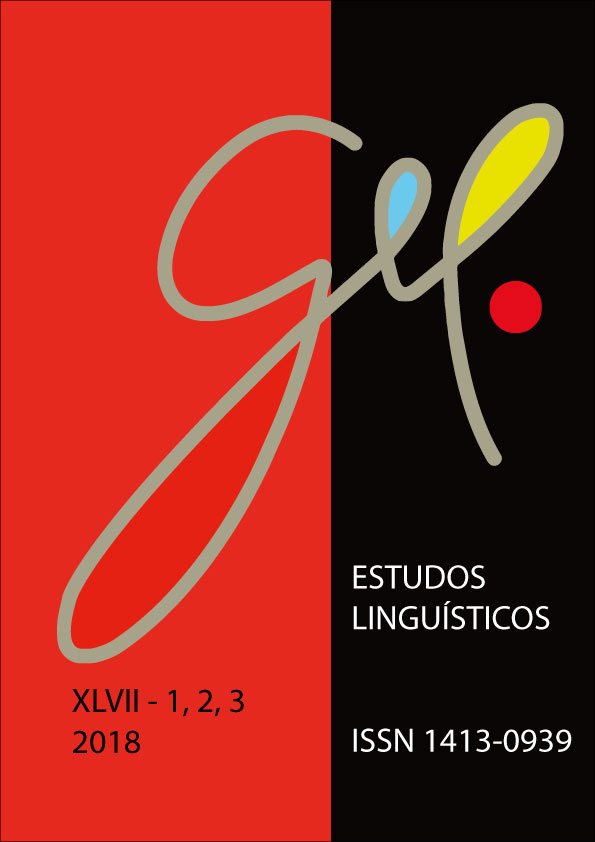Os sujeitos e suas representações: a educação a distância e os dizeres dos alunos acerca da modalidade
DOI:
https://doi.org/10.21165/el.v47i3.1945Palavras-chave:
aluno a distância, imaginário sociodiscursivo, representação, discursoResumo
O objetivo deste trabalho é analisar os sistemas de representação que emergem do discurso de sujeitos que concluíram (ou estão cursando) o ensino a distância, levando-se em conta: 1) a imagem que esses sujeitos constroem a respeito da modalidade; 2) a imagem que elaboram a respeito do perfil de aluno que frequenta esse tipo de ensino. No início do século XXI, com o fortalecimento das Novas Tecnologias de Informação e Comunicação incorporadas ao contexto educacional, ainda havia muita desconfiança do mercado de trabalho e das instituições de ensino presenciais acerca do êxito profissional desses alunos. Entretanto, com os resultados positivos da inserção desses profissionais em setores especializados da sociedade, a modalidade alcançou novo status nas práticas educacionais. Dessa forma, parte-se da hipótese de que a construção das representações desses sujeitos no contexto sócio-histórico-educacional contemporâneo é positiva. Pressupostos da Análise de Discurso francesa e dos Estudos Culturais fundamentarão a análise.Downloads
Referências
ACHARD, P. et al. Papel da memória. 2. ed. Campinas: Pontes, 2007.
BELLONI, M. L. Educação a distância. 5. ed. Campinas: Autores associados, 2008.
BELLONI, M. L. Ensaio sobre a educação a distância no Brasil. Educação & Sociedade, ano XXIII, n. 78, p. 117-142, abr./2002.
CHARAUDEAU, P. Discurso político. 2. ed. São Paulo: Contexto, 2013.
COURTINE, J.-J. Análise do discurso político: o discurso comunista endereçado aos cristãos. São Carlos: EdUfscar, 2009.
FERNANDES, C. A. Análise do discurso: reflexões introdutórias. 2. ed. São Carlos: Editora Claraluz, 2008.
FONTANA, H. A. Tecendo considerações acerca da educação a distância e seus paradigmas. In: FONTANA, H. A.; MACIEL, A. M. da R. (Orgs.). Educação a distância: por que ainda uma interrogação? Jundiaí: Paco Editorial, 2013. p. 11-26.
JODELET, D. Representações sociais: um domínio em expansão. In: JODELET, D. (Org.). As representações sociais. Rio de Janeiro: EdUERJ, 2001. p. 17-44.
MAINGUENEAU, D. Análise de textos de comunicação. São Paulo: Cortez, 2001.
MINTO, L. W. Educação superior e capitalismo no Brasil: problematizando o ensino a distância (EaD). Anais... VI Colóquio MARX-ENGELS. Campinas: Unicamp, 2009.
MOITA LOPES, L. P. da. Identidades fragmentadas: a construção discursiva de raça, gênero e sexualidade em sala de aula. Campinas: Mercado das Letras, 2002.
MOORE, M.; KEARSLEY, G. Educação a distância: uma visão integrada. São Paulo: Cenage Learning, 2007.
MORAN, J. O que é educação a distância. Universidade de São Paulo. 2002. Disponível em: <http://www.eca.usp.br/prof/moran.dist.htm>. Acesso em: 13 fev. 2015.
PÊCHEUX, M. O discurso: estrutura ou acontecimento. 6. ed. Campinas: Pontes Editores, 2012.
PÊCHEUX, M. Semântica e discurso: uma crítica à afirmação do óbvio. 2. ed. Campinas: Editora da Unicamp, 1995.
PÊCHEUX, M.; FUCHS, C. A propósito da Análise Automática do Discurso: atualização e perspectivas (1975). In: GADET, F.; HAK, T. Por uma Análise automática do discurso: uma introdução à obra de Michel Pêcheux. Campinas: EdUnicamp, 1990.
PRETI, O. Educação a distância: inícios e indícios de um percurso. Cuiabá: UFMT, 1996.
ORLANDI, E. P. Identidade linguística escolar. In: SIGNORINI, I. (Org.). Língua(gem) e identidade. Campinas: Mercado das Letras, 1998.
WOODWARD, K. Identidade e diferença: uma introdução teórica e conceitual. In: SILVA, T. T. da. (Org.). Identidade e diferença: a perspectiva dos Estudos Culturais. 15. ed. Petrópolis: Vozes, 2014. p. 7-72.



